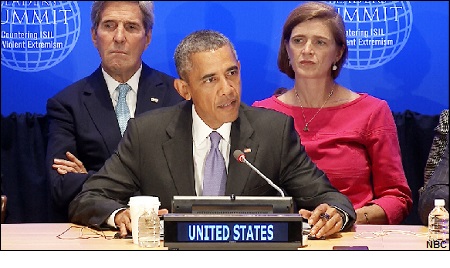
|
|

|
|
| April 18, 2024 |
|
Iraq and Nigeria plead for more counter-terror help at United Nations 
The leaders of Iraq and Nigeria on Tuesday asked for more international support of their efforts to stem the spread of Islamic extremism that is feeding ISIS and its African affiliate, Boko Haram.
Their pleas came during a United Nations summit led by President Obama in which representatives of dozens of countries shared ideas on how to counter the recruitment of would-be terrorists around the world, stanch the flow of those radicalized young people into Syria and Iraq, and block supporters from sending money to the extremist groups. Top billing went to Iraqi Prime Minister Haider Al-Abadi and Nigerian President Muhammadu Buhari, both of whom are on the battle's front lines. There was no representative from the government of Syrian President Bashad Assad, whom Obama blames for a long and bloody civil war that helped give rise to ISIS. Abadi said his country is working to reform its military and root out corruption that hindered its fight against ISIS. With help from a U.S.-led military coalition, ISIS has been driven out of many parts of the country, including the city of Tikrit, where about 80 percent of residents have returned home, Abadi said. But it's not enough, Abadi said. "We can't finance all these battles that we are seeking to win," he said. "We need your help and the help of the international community in the financing and equipping of soldiers. We need your support in order to also take care of the people who lost loved ones and children. We need your help also to determine where the radicals and terrorists are coming from, they're coming from all places of the world, from North America, from Islamic and Arabic countries, too. We need to work with neighboring countries to stop foreign terrorist fighters from killing people in Iraq and Syria and going back to their home countries." Buhari followed with a description of how a regional terror group, Boko Haram, pledged allegiance to ISIS in March and began adopting many of its recruitment and killing techniques, exploiting ethnic tensions and economic anxieties, conducting public beheadings and mass executions. The situation requires an "all hands on deck" response, he said. Abadi and Buhari advocated for a multi-front international campaign suggested by Obama and United Nations Secretary General Ban Ki-moon that ranges from the military and financial to the economic and social, including an organized effort to counter ISIS' use of social media to inspire followers. "We face a grave challenge," Obama said in his introductory remarks. "We have to be clear-eyed about the fact this is very hard work ... This is not going to be turned around overnight." And yet Obama predicted that ISIS would lose the global battle "because it has nothing to offer other than suffering and death. We will ultimately prevail because we are guided by a stronger, better vision." The United States has its work cut out. A Congressional report accused the federal government Tuesday of lacking a cohesive strategy for stopping Americans from traveling to Syria and joining ISIS. Also on Tuesday, the U.S. Treasury Department announced that it had added to a list of ISIS supporters who are being blocked from conducting business on international financial systems. Many of those individuals are also on a U.N. sanctions list that prohibits them from traveling and transferring money among member countries. (Source: NBC News) Story Date: September 30, 2015
|